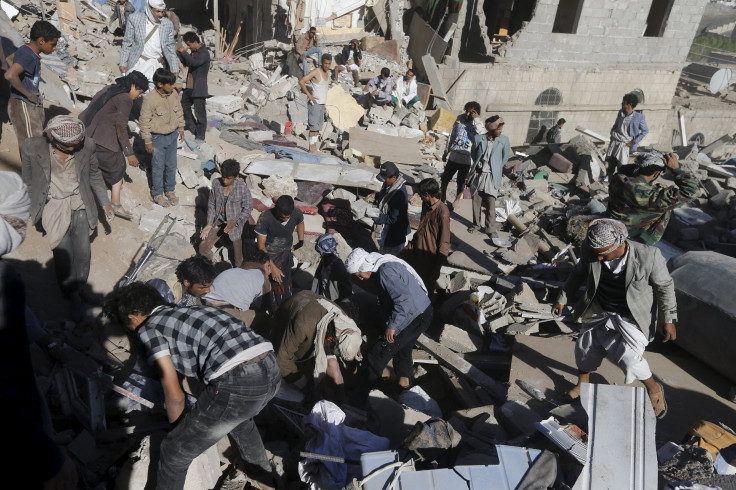Kerry, Saudi Foreign Minister Announce Potential Humanitarian Ceasefire In Yemen

ISTANBUL -- After weeks of aerial bombardments by the Saudi Arabia-led coalition and detention of Yemeni citizens by Houthi rebels, the situation on the ground in cities such as Sanaa and Aden has led to a humanitarian disaster. That’s why Saudi Arabian Foreign Minister Adel al-Jubeir and U.S. Secretary of State John Kerry announced Thursday in Riyadh their proposition of a “humanitarian pause” in Yemen -- a stop in the fighting to allow for the distribution of aid.
Kerry and al-Jubeir said at a joint press conference Thursday that the ceasefire plan was contingent on the agreement of Iran and the Houthi rebels in Yemen and that it could be implemented within the next few days, assuming all parties sign off on it. Kerry and al-Jubeir are set to meet with foreign ministers of other Arab countries in Paris Friday, when they plan to give an update on the proposed deal, the Associated Press reported.
If implemented, the humanitarian pause would require “no bombing, no shooting” and no repositioning of forces, Kerry said at the press conference.
The announcement of the proposition came after Kerry met with Yemen’s exiled President Abed Rabbo Mansour Hadi and his advisers in the Saudi capital about the Houthis’ consolidation of power in the southern port city of Aden. Loyal to former Yemeni President Ali Abdullah Saleh, the rebels have gained ground in the past week, capturing the presidential palace and other strategic points in Sanaa.
The Saudi airstrikes have killed dozens, maybe hundreds, of Houthi rebels since the fighting began in March, but the numbers are unclear. Despite these casualties, the Houthis have been able to hold on to their land, especially in Aden, through fear tactics, according to human-rights groups.
Human Rights Watch released a report Thursday, claiming Houthi rebels in Aden attacked, detained and shot civilians in the city, and it said the incidents amount to possible war crimes.
“Aden’s civilians are already in dire straits, without being attacked, detained, and held hostage,” Joe Stork, the deputy director of the Middle East and North Africa unit at Human Rights Watch, said in the report. “Leaders of the Houthis and other forces need to protect civilians, not abuse and terrorize them.”
Aden’s civilians have suffered some of the worst violence in Yemen, according to the report. The people there, as in many other places throughout the country, are suffering from a lack of food and water, fuel and medical supplies not only because of the fighting on the ground but also because of a sea blockade by the Saudi-led coalition.
“The difficulty of investigating the fighting in Yemen may mean abuses like these in Aden are just the tip of the iceberg,” Stork said in the report.
According to United Nations estimates, about 650 civilians have been killed and about 300,000 have been displaced in Yemen since the beginning of the fighting March 26. Most of the civilians are still inside the country because there is no easy way to get out. However, some have made their way onto boats and crossed the Gulf of Aden to reach the shores of Djibouti in Africa.
© Copyright IBTimes 2024. All rights reserved.




















